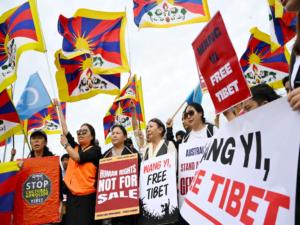 The situation in Tibet is complicated and has been a source of concern for many years. The People’s Republic of China has been accused of suppressing Tibetan voices calling for more autonomy and human rights in the region. The Chinese government’s actions in Tibet have been criticized for infringing fundamental human rights such as freedom of expression, assembly, and religion. Many Tibetans have been detained, imprisoned, or forced to flee their homes in search of safety.
The situation in Tibet is complicated and has been a source of concern for many years. The People’s Republic of China has been accused of suppressing Tibetan voices calling for more autonomy and human rights in the region. The Chinese government’s actions in Tibet have been criticized for infringing fundamental human rights such as freedom of expression, assembly, and religion. Many Tibetans have been detained, imprisoned, or forced to flee their homes in search of safety.
China has increased its crackdown on the use of the Tibetan language, particularly on social media platforms such as Douyin, China’s version of TikTok, in a concerted effort to undermine Tibetan cultural identity and pro-freedom voices. This move is part of a broader strategy to assimilate Tibetans into the dominant Han Chinese culture, eroding their unique linguistic and cultural heritage.
The Tibetan language prohibition on platforms such as Douyin is more than just censorship; it is a purposeful attempt to reduce Tibetan culture’s visibility and influence in the digital age. By prohibiting the use of Tibetan in internet areas, the Chinese Communist Party (CCP) attempts to muzzle criticism and squelch any expression of Tibetan identity that threatens its narrative. For many Tibetans, social media had become an essential instrument for keeping cultural links, sharing traditions, and expressing their desire for freedom. The crackdown has made these practices more dangerous.
China’s crackdown on Tibetan voices advocating for freedom has escalated, with authorities employing extensive repressive tactics to suppress dissent. Tibetan activists, religious leaders, and ordinary citizens are under constant monitoring, with advanced technologies used to track and control their movements, communications, and activities.
The Chinese government’s intensified crackdown aims to erase Tibetan cultural identity and suppress any aspirations for independence. Harsh penalties are imposed on those expressing pro-Tibetan sentiments, reflecting a broader effort to control and assimilate the region. This suppression showcasing the ongoing struggle for Tibetans to preserve their cultural and national identity.
This tyranny goes beyond mere linguistic limits. Tibetan activists, writers, and even regular residents who utilize their own language online or espouse Tibetan liberation face harsh consequences such as surveillance, harassment, and jail. The CCP’s measures are part of a larger attempt to silence Tibetan voices and remove Tibet’s unique cultural identity from public consciousness.
The world community cannot turn a blind eye to this digital persecution. Global human rights organizations, governments, and technology businesses must put pressure on China to respect Tibetans’ linguistic and cultural rights. The censoring of Tibetan voices on social media is a grave injustice that highlights Tibet’s ongoing struggle for cultural survival and freedom—a struggle that requires immediate international attention and support.
China’s Crackdown on Tibetan Voices of Freedom: The Silencing of a Culture on Social Media
Date:



